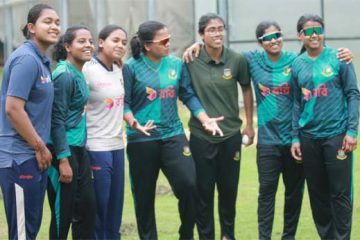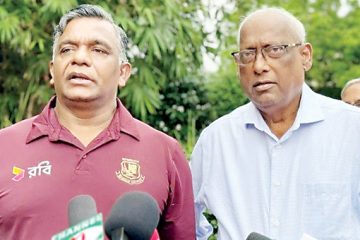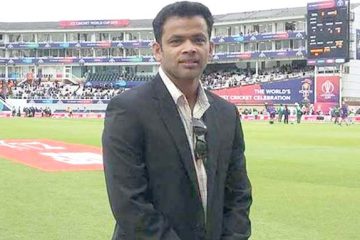Abdur Razzak, hardly the captain’s most trusted fielder, never ran so fast, that too under a swerving ball that hasn’t yet passed over his shoulder. Grant Elliott’s top-edged sweep off Shakib Al Hasan that took off over square-leg began its abrupt descent while Razzak was still a few metres short of being under it.
A moment later, he just about held on to the catch, the 25th of his ODI career, which gave Bangladesh a lift in a game that they eventually won. The catch has been a focal point in the marked improvement of the Tigers’ fielding during the series against New Zealand, mainly because one of the seniors and perennially ‘weak’ fielders made an important contribution.
But Junaed Siddiqui’s two dropped catches and Mahmudullah Riyad’s misjudged effort in the next match threatened to undo some of the progress made during the series. The victory in the last match and the overall fielding in the series put that thought away, but it is a reality that fielding coach Julien Fountain seems to be comfortable with.
The 40-year-old Englishman is one of two inclusions in the coaching staff that is crucial to the team’s prospects in the upcoming World Cup. He joined at the end of August and found himself surrounded with players often vilified for their distinct lack of discipline when not batting and bowling.
It was supposed to be very tough, but Fountain’s lack of acquaintance with Bangladesh cricket coupled with the players’ eagerness to work hard was always going to work in his advantage.
“The guys have been very responsive. They have learned lots of new things, we have tweaked some of their skills and showed them some new things,” said Fountain yesterday during a break in training at the Sher-e-Bangla National Stadium in Mirpur.
“Above all, they changed their aggression level. They are now more aggressive and competitive, which is what you need as an elite player,” he added.
Fountain is a vastly experienced coach, armed with the UKCC ECB Level 3 coaching degree. He has worked as a fielding coach in England, Pakistan and West Indies (once with the national team and the Stanford Superstars in 2008) before coming to Bangladesh and is a good source for a pragmatic view of fielding in the region’s cricket. “I think sub-continent teams, generally speaking, have had a bad reputation for fielding. Teams [here] traditionally love to bat and bowl. Sri Lanka changed that 8-9 years ago,” opined Fountain.
He was confident however to say that the Tigers are certainly up there somewhere, but still have a few miles to catch up on. However, his short contract (till the World Cup) is a handicap as the players are hardly available for even half the period of his contract. “When I came here, the time and basically, the more they stay away from us, the less we have them,” said Fountain, who has used a “fielding analysis system” software to help him analyse every aspect of fielding.
During matches, he is mainly based in the media centre, tracking down his charges and collecting relevant data.
Unmistakably, he has been the hardest working member of Jamie Siddons’s coaching staff since his arrival, and Fountain has not been restricted to fielding.
In the ongoing camp, he has busied himself working with the tail-enders’ batting, another perennial headache. For a man assigned to make sure the Tigers save 50 runs in every game, Fountain is certainly looking to make sure his contribution to the team is much bigger.




















